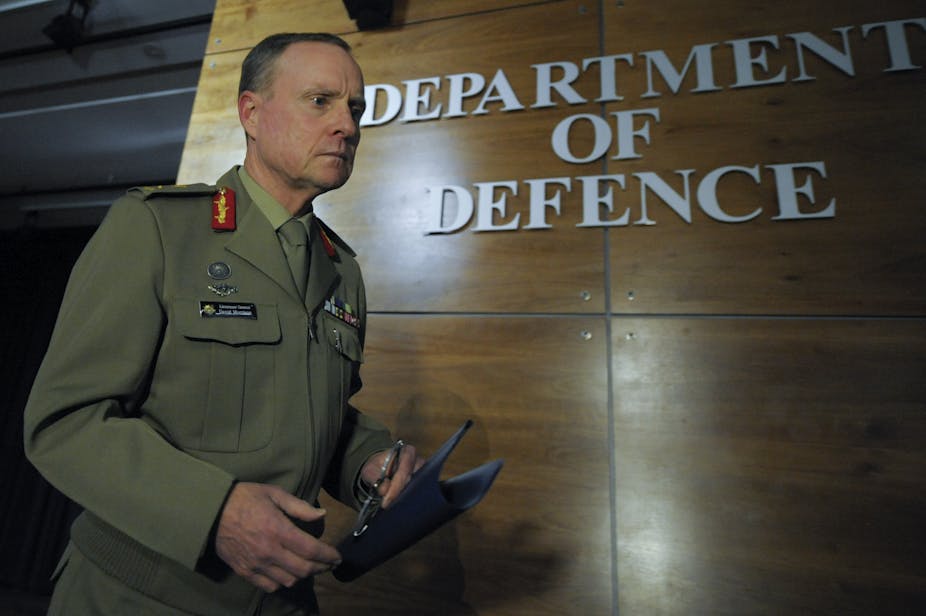The Australian Defence Force (ADF) is again confronted by allegations of sexual humiliation and denigration of serving female members.
The latest scandal involves claims that emails containing explicit images of women were circulated between up to 100 or more Defence Force personnel. A number of the members involved have already been suspended, including several senior officers.
In a video message, the Chief of the Australian Army, Lieutentant-General David Morrison, vowed to rid the Australian Defence Force of those guilty of the damaging behaviour:
On all operations, female soldiers and officers have proven themselves worthy of the best traditions of the Australian Army. They are vital to us maintaining our capability now and into the future.
If that does not suit you then get out. You may find another employer where your attitude and behaviour is acceptable but I doubt it.
The Conversation spoke with Flinders University’s Ben Wadham, an expert on military culture, on what the ADF is doing to combat such behaviour and whether some cultural problems are perhaps beyond reform.
Are these recurring scandals a demonstration of systematic cultural problems within the ADF?
Yesterday was the latest scandal since the Skype affair in April 2011. The Skype affair led to a range of cultural reviews to address the treatment of women within the Australian Defence Force. The reviews found there was a culture of misogyny and an environment in which it was difficult for women’s careers to proceed.
There was also a culture where demeaning women and objectifying women, and others of different ethnic and social backgrounds, was part of the tradition. So yesterday’s incident is not a surprise, but it still is shocking. It demonstrates, for various reasons, the intensity with which these sorts of values pervade the Australian Army.
Do we have to accept that perhaps there are intractable cultural problems within the ADF?
I think there is a structured element to the way in which militaries operate in a liberal-democratic society, and more specifically, an Australian society. When you are trained to be a soldier you are taken away from your civilian background. You are then re-made and it is a very profound remaking of someone. People in the Australian Defence Force, or in any military, seem to see themselves as quite separate from broader society.
That sense of separation tends to form a part of the culture. It gives some military members a sense of license, a sense that they are above broader Australian standards, a sense they are above the law and in order to reassert that sense of self they end up engaging in sexually, racially or ethnically objectifying practices. These often lead into criminal practices as well.
Are we wrong-headed in expecting an HR code more applicable to a modern office to also fit an organisation that has the ultimate objective of killing others?
No, I don’t think so. If you look at the Australian Defence Force, in particular the Australian Army, it is only a very small percentage of those military personnel that are engaged in a “more-heated” environment. The Australian Defence force is more a giant support network or service institution than simply a combat institution.
These sorts of activities tend to happen more where the combat imperative is stronger, that culture still does pervade throughout the whole institution. There is no correlation between training people in a particular way to be good and effective combatants and this sort of behaviour. In fact they are the antithesis of the professionalism that the Australian Defence Force espouses.
Could the ADF be doing more to curb these cultural issues?
I think there are two sides to this. Firstly, the Australian Defence Force is engaging with broader civic initiatives, such as generation and the development of equity-type organisations – cultural diversity, general awareness, reporting and recording activities – so that when things do happen they are effectively dealt with. These sorts of things indicate the Australian Defence Force is serious.
But the Australian Defence Force, by its very nature, sees itself as quite separate from broader Australian society and is therefore unable to see the root cause of its problem. This is partially because the root cause is the development of core and military effectiveness. It is unwilling to address that part of its core business and that means that within the service, there is great ambivalence about taking on civic initiative and interventions.
Do you think scandals like this damage the ADF’s self-imposed goal of increasing the number of women in the army by next year?
I think it does. But I think it affects moreso how parents consider allowing their children to enter the defence force. I think that the defence force provides an adventurous and exciting career path for young people making the transition from school into the workforce.
From my research it doesn’t seem to be dissuaded by these sorts of events. But it does dissuade parents, and parents do have a strong influence on children as they are leaving school and entering the workforce.

